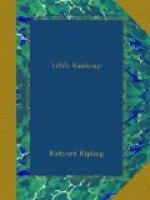More corpses; more stretches of moonlit, white road, a string of sleeping camels at rest by the wayside; a vision of scudding jackals; ekka-ponies asleep—the harness still on their backs, and the brass-studded country carts, winking in the moonlight—and again more corpses. Wherever a grain cart atilt, a tree trunk, a sawn log, a couple of bamboos and a few handfuls of thatch cast a shadow, the ground is covered with them. They lie—some face downwards, arms folded, in the dust; some with clasped hands flung up above their heads; some curled up dog-wise; some thrown like limp gunny-bags over the side of the grain carts; and some bowed with their brows on their knees in the full glare of the Moon. It would be a comfort if they were only given to snoring; but they are not, and the likeness to corpses is unbroken in all respects save one. The lean dogs snuff at them and turn away. Here and there a tiny child lies on his father’s bedstead, and a protecting arm is thrown round it in every instance. But, for the most part, the children sleep with their mothers on the house-tops. Yellow-skinned white-toothed pariahs are not to be trusted within reach of brown bodies.
A stifling hot blast from the mouth of the Delhi Gate nearly ends my resolution of entering the City of Dreadful Night at this hour. It is a compound of all evil savours, animal and vegetable, that a walled city can brew in a day and a night. The temperature within the motionless groves of plantain and orange-trees outside the city walls seems chilly by comparison. Heaven help all sick persons and young children within the city to-night! The high house-walls are still radiating heat savagely, and from obscure side gullies fetid breezes eddy that ought to poison a buffalo. But the buffaloes do not heed. A drove of them are parading the vacant main street; stopping now and then to lay their ponderous muzzles against the closed shutters of a grain-dealer’s shops and to blow thereon like grampuses.
Then silence follows—the silence that is full of the night noises of a great city. A stringed instrument of some kind is just, and only just, audible. High overhead some one throws open a window, and the rattle of the wood-work echoes down the empty street. On one of the roofs, a hookah is in full blast; and the men are talking softly as the pipe gutters. A little farther on, the noise of conversation is more distinct. A slit of light shows itself between the sliding shutters of a shop. Inside, a stubble-bearded, weary-eyed trader is balancing his account-books among the bales of cotton prints that surround him. Three sheeted figures bear him company, and throw in a remark from time to time. First he makes an entry, then a remark; then passes the back of his hand across his streaming forehead. The heat in the built-in street is fearful. Inside the shops it must be almost unendurable. But the work goes on steadily; entry, guttural growl, and uplifted hand-stroke succeeding each other with the precision of clock-work.




